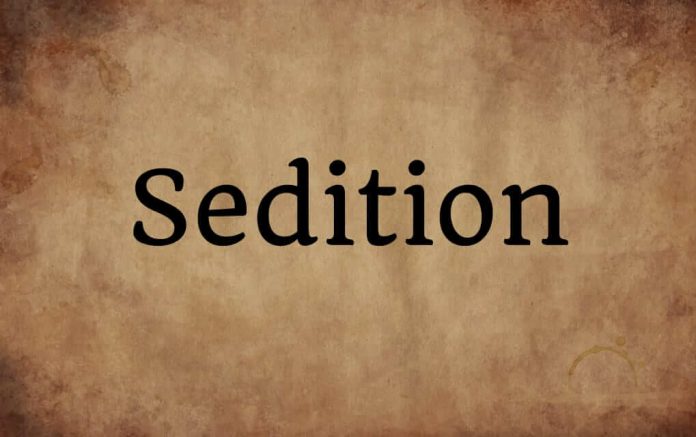This article has been written by Oishika Banerji of Amity Law School, Kolkata. This article provides a detailed analysis of Sharjeel Imam’s speech with respect to sedition and the subsequent decision-making by the Allahabad High Court.
Table of Contents
Introduction
The law of sedition in India is always in a tussle with the Right to Freedom of Expression guaranteed under Article 19(1)(a) of the Indian Constitution. In recent times such conflicts are knocking on the doors of the courts often resulting in a huge hue and cry across the nation. Every other day dissenters are getting arrested on grounds that they are encouraging violence against the State as a whole. While the judiciary has been extremely liberal in interpreting the sedition law in India thereby providing relief to the non-conformists, the executive authorities are carrying on their duty of detaining them. Sharjeel Imam has been one of the detainees who was arrested because of his speech which was allegedly claimed by the police authorities to encourage violence among the listeners against the government on account of the Citizenship (Amendment) Act, 2019, that had already taken the State in turmoil. This article highlights the Sharjeel Imam v. State of Uttar Pradesh (2021) along with the bail order delivered by the Allahabad High Court.
Indian perception surrounding sedition
The law of sedition as per Section 124-A of the Indian Penal Code (IPC), 1860 draws its roots from the British Raj where it was used to prevent any offences against the State. The sedition statute was meant to be used only in exceptional cases when the country’s security and sovereignty were threatened, according to the Kedar Nath decision in 1962. However, there are increasing indications that this rule has been used to repress dissent and free speech against political opponents. According to recent statistics provided by a blog named Article 14, 25 sedition cases were brought following the anti-Citizenship Amendment Act rallies, 22 after the Hathras gang rape, and 27 after the Pulwama event. In total, 405 Indians were charged with sedition in the previous decade, with 96 percent of the cases being brought after 2014. Furthermore, according to the National Crime Records Bureau, sedition charges have increased by 163 percent from 47 in 2014 to 93 in 2019. The conversion rate from cases to conviction, on the other hand, is only 3 percent which demonstrates how the police and other state officials are indiscriminately employing sedition laws to instill terror among residents and muzzle any criticism or opposition against the government.
The fiasco over Sharjeel Imam’s speech
A brief clip from an almost 40-minute lecture by Sharjeel Imam, a Ph.D. researcher at Jawaharlal Nehru University, has sparked a lot of political and media buzz. Five states had reportedly filed FIRs against Sharjeel Imam, who had been peacefully demonstrating against the Citizenship (Amendment) Act, 2019, which was passed in January 2020. He was accused of offences under Sections 124A, 153A, 153B, and 505(2) of the Indian Penal Code, 1860. In October of this year, Sharjeel Imam was denied regular bail in the present matter after the Delhi Trial Court found that the tone and tenor of the inflammatory statements made by Imam have a crippling impact on public tranquillity, peace, and harmony. Despite the fact that the evidence against Imam was “scarce and sketchy” to support a prima facie case that his speeches incited riots, the Court denied him bail, stating that more investigation was required to determine whether the speech amounted to sedition under Section 124A IPC and promotion of communal disharmony under Section 153A IPC.
Sharjeel Imam v. the State of Uttar Pradesh (2021)
The Bench of Justice Saumitra Dayal Singh of the Allahabad High Court granted bail to Sharjeel Imam who was convicted in the Aligarh Muslim University sedition case for allegedly delivering an ‘anti-national speech’ at AMU [Aligarh Muslim University] during Anti CAA-NRC protests, after being confined for more than one year and two months, on his furnishing a personal bond of Rs.50K.
Facts of the case
The circumstances of the case are that on December 15, 2019, police got information about a protest led by students and residents of Jamia Nagar against the Citizenship Amendment Bill (CAB). A crowd allegedly obstructed traffic on the road and began vandalizing public and private vehicles along with properties with sticks, stones, and bricks. Imam was accused of inciting a religious group against the government by instilling dread in their minds about CAB and NRC, as per the claims. According to the prosecution, Imam’s comments were seditious, communal, and divisive in nature, and were intended to foster animosity between various religions.
Contentions of the applicant
- It has been submitted by learned counsel for the applicant on a prima facie basis, only for the purpose of granting bail, that the ingredients of the offence of sedition were not made out, as the applicant had not exhorted the listeners to take up arms or to engage in any violent act that may have threatened the integrity and unity of the country or to commit any act of hatred against any community.
- The counsel had contended that there was no evidence in the case diary that the applicant’s statements had any influence on the listeners. Despite the fact that the speech was made on January 16, 2020, and the FIR was filed nine days later, no incident occurred that could be utilized to establish the effect created by the applicant’s statement. There is absolutely no evidence as to that. The counsel further stated that the FIR could not have been registered except with prior sanction obtained under Section 196 of the Code of Criminal Procedure, 1973 which lays down the provision for “prosecution for offences against the State and for criminal conspiracy to commit such offence”.
- The counsel had further contended that the FIR filed against his client was lodged with a delay of nine days and multiple FIRs were lodged against the applicant arising from the same occurrence.
Contentions of the respondent
- The language of the FIR, according to the learned Additional Advocate General, plainly brings out the components of crimes under Sections 124A, 153A, 156, 153B, and 505(2) Indian Penal Code, 1860. Further, the applicant’s criminal background, which included comparable incidents as well as cases of serious crimes, including those punishable under Section 302 of the Indian Penal Code, 1860, was heavily relied upon by the Respondent’s counsel.
- The counsel further made reference to the acts of the applicant in which there has been habitual engagement in such illegal activities prior to and after the occurrence of the present one. As a result, it had been argued that the applicant should not be released on bail because he was likely to violate the bail terms thereby endangering public order.
Observations made by the Allahabad High Court
A Single Bench of the Allahabad High Court comprising of Justice Saumitra Dayal Singh made the following observations while granting bail to Sharjeel Imam:
- It should be emphasized that the applicant did not call anybody to use arms, and no violence was incited as a result of the applicant’s remarks, which is indisputable. The specific imputations made and the effect elicited by the applicant’s words, gestures, and other actions may still be scrutinized during the trial, which is awaited.
- As the applicant was already confined for a period of one year and two months against a maximum punishment that he may suffer on conviction being three years, this becomes the sole factor as to why the application should be granted bail at this stage, in the undisputed facts of the present case.
- The Court rejected the applicant’s contention where he had claimed that the FIR could not have been registered except with prior sanction obtained under Section 196 of the Code of Criminal Procedure, 1973 (CrPC) by stating that, Section 196 Cr.P.C. imposes a bar to cognizance rather than registration of an FIR for a cognizable offence.
- Further, the Court clarified that in terms of the delay in lodging an FIR, it is nine days. This subject would be left to be investigated by the trial court without any final conclusions being reached at this moment as for the purpose of grant of bail, the same is not considered to be relevant in the entirety of the facts and circumstances of the present case.
- No jurisdictional defect can be shown in the present case as the speech having been inside the State of U.P. and the FIR having been registered with respect to that occurrence at Aligarh, eliminates the said defect.
- The applicant will not be deprived of his bail solely on the ground that he has past criminal allegations levied on him.
- Three bail conditions were laid down by the Court which are as follows:
- During the inquiry or trial, the applicant shall not interfere with the prosecution evidence by intimidating or pressuring the witness.
- The applicant must participate fully in the trial without requesting an adjournment.
- After being released on bail, the applicant must not engage in any criminal activity or commit any crime.
Conclusion
While raising concerns about the indiscriminate application of the sedition law against people who expressed their dissatisfaction with the government’s COVID-19 management, or even for seeking assistance in obtaining medical access, equipment, drugs, and oxygen cylinders, particularly during the second wave of the pandemic, Justice D.Y. Chandrachud had said that “it is time to establish the bounds of sedition,”. In a recent judgement while quashing a sedition case against Mr. Dua for allegedly making derogatory remarks about the Prime Minister and the Union Government in a YouTube telecast, Justice U.U. Lalit upheld the right of every journalist to criticise, even brutally, government policies in order to improve or change them through legal means. In light of the present case, one should not pass any comments taking into note that the matter remains sub-judice. But what is relevant to state on account of the bail order by the Hon’ble High Court of Allahabad, is that modern democracy should not be encouraging laws like that of sedition as it not only curbs the basic rights of the people in the nation but also restricts the growth process of the nation as a whole.
References
- https://www.livelaw.in/news-updates/allahabad-high-court-grants-bail-sharjeel-imam-aligarh-sedition-case-speech-amu-186477.
- https://thewire.in/rights/sharjeel-imam-sedition.
- https://www.barandbench.com/news/litigation/anti-caa-speech-sharjeel-imam-denied-bail-by-delhi-court-in-sedition-case.
- https://www.article-14.com/post/accused-of-sedition-terrorism-for-a-speech-jnu-student-steadfast-after-535-days-in-jail-60f06089bfd4d.
LawSikho has created a telegram group for exchanging legal knowledge, referrals and various opportunities. You can click on this link and join:
https://t.me/joinchat/L9vr7LmS9pJjYTQ9
Follow us on Instagram and subscribe to our YouTube channel for more amazing legal content.
 Serato DJ Crack 2025Serato DJ PRO Crack
Serato DJ Crack 2025Serato DJ PRO Crack








 Allow notifications
Allow notifications


